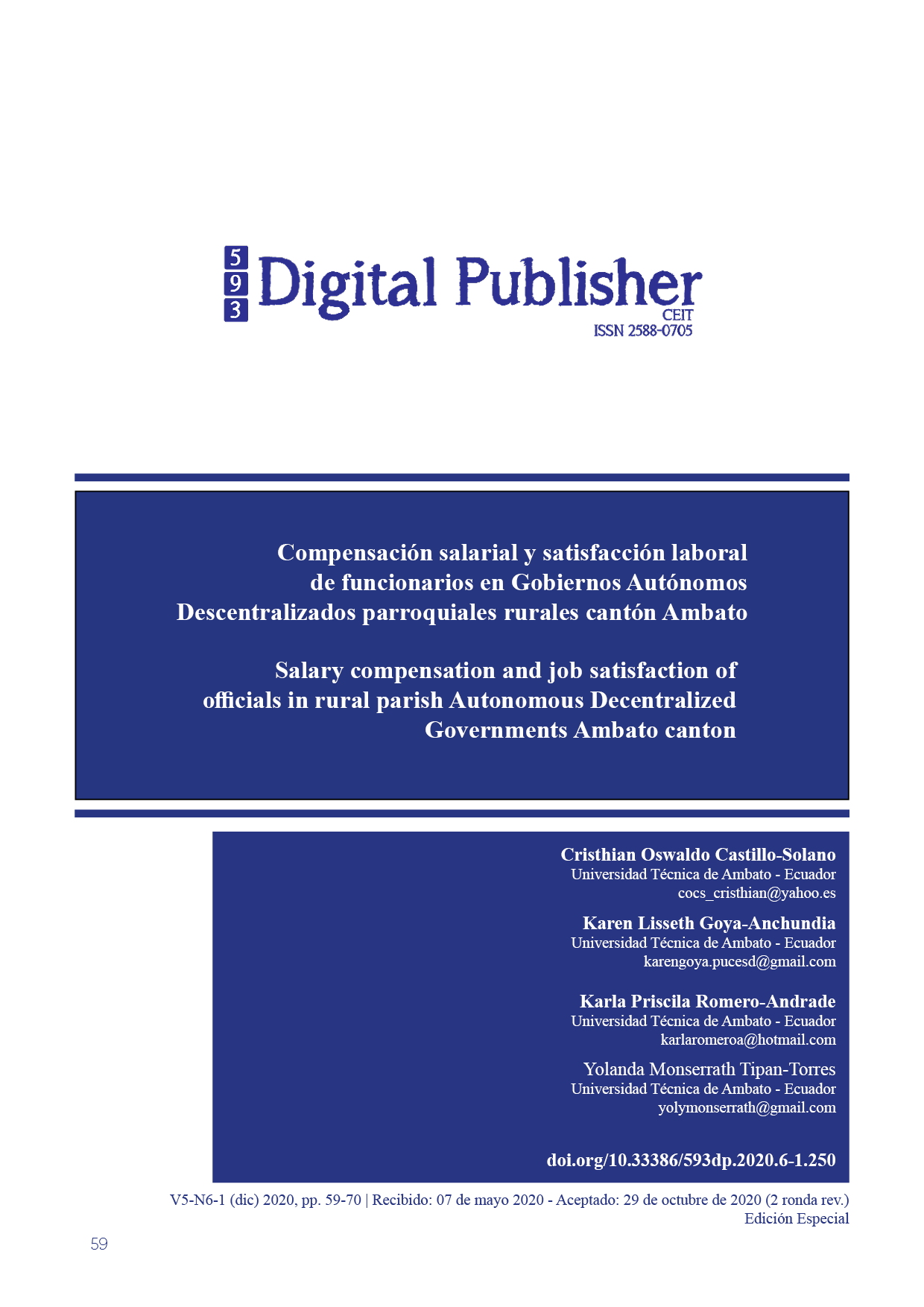Salary compensation and job satisfaction of officials in rural parish Autonomous Decentralized Governments Ambato canton
Main Article Content
Abstract
The current economic situation faced by decentralized autonomous governments, prevents them from targeting the design and application of more competitive compensation models that allow job satisfaction for their officials. The objective of this research was to analyze how salary compensation affects job satisfaction of the officials of the Autonomous Decentralized Parish Rural Governments of Ambato canton. The methodological design is descriptive with a qualitative, non-experimental and transversal approach. For the analysis of salary compensation, a psychometric test called the Salary Well-Being Scale was applied and to measure job satisfaction the SL-SPC Job Satisfaction Scale instrument. The questionnaires were applied to 90 workers from the 18 rural parishes of the city. According to the results, it was determined that salary compensation and job satisfaction are two variables that directly affect the performance of employees, as well as their feelings of personal and professional fulfillment. Both are considered as a key point for people to feel motivated and contribute with their best effort in the performance of their assigned functions, providing better service and timely assistance. Therefore, in conclusion, these findings are important for senior managers to contemplate the design of strategies that favor salary compensation and therefore job satisfaction is favorable in the institutions.
Downloads
Article Details

This work is licensed under a Creative Commons Attribution-NonCommercial-ShareAlike 4.0 International License.
1. Derechos de autor
Las obras que se publican en 593 Digital Publisher CEIT están sujetas a los siguientes términos:
1.1. 593 Digital Publisher CEIT, conserva los derechos patrimoniales (copyright) de las obras publicadas, favorece y permite la reutilización de las mismas bajo la licencia Licencia Creative Commons 4.0 de Reconocimiento-NoComercial-CompartirIgual 4.0, por lo cual se pueden copiar, usar, difundir, transmitir y exponer públicamente, siempre que:
1.1.a. Se cite la autoría y fuente original de su publicación (revista, editorial, URL).
1.1.b. No se usen para fines comerciales u onerosos.
1.1.c. Se mencione la existencia y especificaciones de esta licencia de uso.
References
Lawler, E., & Porter, L. W. (1967). The effect of performance on job satisfaction. Industrial Relations,. 20-28.
Garcia- Guiu, C., Molero, F., & Moya, M. (2015). Authentic leardership, group cohesion an group identification in security an emergency teams. Psicothema, 59. 64.
Maslow, A. (1954). Motivation and Personality. New York Harper.
Sánchez-Sellero, M. (2014). CARACTERÍSTICAS ORGANIZACIONALES DE LA SATISFACCIÓN LABORAL EN ESPAÑA/Características organizacionais da satisfação no trabalho na. Revista Colombiana de Psicologia, 329- 345.
Baena., G. M. (2017). Metodología de la investigación (3a. ed.), , 2017. Colombia: Grupo Editorial Patria.
Chiavenato, I. (2009). Comportamiento Organizacional: la dinamica del exito en las organizaciones. Bogota: MC Graw- Hill.
Maslow, A. (1954). Motivation and Personality. New York Harper.
Seligman, M., & Csikszentmihalyi, M. (2000). Positive Psychology; an introduction. . American Psychologist, 5-14.
Arvey, R., Carter , G., Buerkley, D., Cooper , C., & Robertson, , I. (1991). Job satisfaction: dispositional and situational influences, (Coords) International review of industrial and organizational psychology, . New York: Wiley, .
Abrajan, M.; Contreras, J.; y Montoya, S. (2009). Grado de Satisfacción Laboral y Condiciones De Trabajo: Una Exploración Cualitativa. Enseñanza e investigación en psicología, 14(1), 105-118.
Aguirre, C.; Gallo, A.; Ibarra, A.; & Sánchez, J. (2018). Relación entre estrés laboral y burnout en una muestra de controladores de tráfico aéreo en Chile. Ciencias Psicológicas, 12(2), 239-248. https://dx.doi.org/10.22235/cp.v12i2.1688
Arboleda-Posada, Gladys Irene, & Cardona-Jiménez, Jairo León. (2018). Percepción de la satisfacción con la labor desempeñada y factores de motivación del personal de las instituciones prestadoras de servicios de salud (IPS) del valle de Aburrá, 2011. Revista Gerencia y Políticas de Salud, 17(35), 222-234. https://dx.doi.org/10.11144/javeriana.rgps17-35.psld
Azanza, Garazi., Domínguez, África., Moriano, Juan., & Molero, Fernando. (2014). Capital psicológico positivo: validación del cuestionario PCQ en España. Anales de psicología, 30(1), 294-301.
Calderón, J.; Laca, F.; Pando, M. (2017). La autoeficacia como mediador entre el estrés laboral y el bienestar. Psicología y Salud, 27(1), 71-78.
Calderón, G.; Murillo, S.; Torres. K. (2003). Cultura organizacional y bienestar laboral. Cuadernos de administración, 16(25), 109-137.
Chiang Vega, M.; Riquelme Neira, G.; Rivas Escobar, P. (2018). Relación entre Satisfacción Laboral, Estrés Laboral y sus Resultados en Trabajadores de una Institución de Beneficencia de la Provincia de Concepción. Ciencia & trabajo, 20(63), 178-186. https://dx.doi.org/10.4067/S0718-24492018000300178
Cornejo, Felipe A.; Rodríguez M., Andrés A.; Paz Retamal, Maria; Lizana, José N. Clima y Satisfacción Laboral como Predictores del Desempeño: En una Organización Estatal Chilena. Salud y Sociedad, 2(2), 219-234.
Cuesta, A. (2016). Gestion del Talento Humano y del Conocimiento. Bogota: ECOE Ediciones.
Enríquez, E.; Martinez, J.; Guevara, L. (2015). Relación de la inteligencia emocional con el desempeño laboral. Ciencia & Salud, 3(11), 41-46.
Galaz, J. (2003). La Satisfaccion laboral de los Academicos Mexicanos en una Universidad Estatal Publica: la Realidad Institucional Bajo la Lente del Profesorado. Mexico: ANUIES.
Garnica, J. (2018). Mobbing y rendimiento laboral en personal obrero. Revista Arbitrada Interdisciplinaria de Ciencias de la Salud. Salud y Vida, 2(4), 110-146.
Hernández Bonilla, B.; Ruiz Reynoso, A.; Ramírez Cortés, V.; Sandoval Trujillo, S.; Méndez Guevara, L. (2018). Motivos y factores que intervienen en el compromiso organizacional. RIDE. Revista Iberoamericana para la Investigación y el Desarrollo Educativo, 8(16), 820-846. https://dx.doi.org/10.23913/ride.v8i16.370
Jaramillo, O. (2005). Gestión del talento humano en la micro, pequeña y mediana empresa vinculada al programa Expopyme de la Universidad del Norte en los sectores de confecciones y alimentos. Pensamiento & gestión, (18), 103-137.
Jiménez-González, G.; Rivera-Ladino, A.; Gaibao-Pérez, M. (2019). Las condiciones de bienestar laboral en una empresa del sector Hotelero. Estudio de caso en Medellín, Colombia. Prospectiva, (28), 203-226. https://dx.doi.org/10.25100/prts.v0i28.7225
Longo, G. (2006). Evaluación y gestión del rendimeinto laboral en las Administraciones públicas. Revista Presupuesto y Gasto Publico, 41, 127-144.
López, P.; Díaz, Z.; Segredo, A., Pomares, Y. (2017). Evaluación de la gestión del talento humano en entorno hospitalario cubano. Revista Cubana de Salud Pública, 43, 3-15.
Madero-Gómez, S.; & Rodríguez-Delgado, D. (2018). Relación entre las teorías X y Y de McGregor, las formas de retribuir y la satisfacción de las personas en su trabajo. CienciaUAT, 13(1), 95-107. https://dx.doi.org/10.29059/cienciauat.v13i1.1014
Manosalvas, C.; Manosalvas, L.; Nieves, J. (2015). El clima organizacional y la satisfacción laboral: un análisis cuantitativo riguroso de su relación. AD-minister, (26).
Marín, H.; & Placencia, M. (2017). Motivación y satisfacción laboral del personal de una organización de salud del sector privado. Horizonte Médico (Lima), 17(4), 42-52. https://dx.doi.org/https://doi.org/10.24265/horizmed.2017.v17n4.08
Muñoz, T.; Gómez, A.; & Sánchez, B. (2016). Satisfacción laboral en los docentes de educación infantil, primaria y secundaria. Gestión de la educación, 7(1), 161-177.
Nader, M., & Castro, A. (2010). Teorías implícitas del liderazgo, LMX y bienestar laboral: generalización de un modelo teórico. Revista de psicología, 28(2), 227-258.
Oliveira, M.; Natividade, J.; Assis, R.; Mambrini, N. (2019). Performance, Satisfaction and Intention to Remain in Organizations: Individual to Contextual Predictors. Trends in Psychology, 27(2), 549-567. Epub June 13, 2019.https://dx.doi.org/10.9788/tp2019.2-18
Rojas, N. (2017). Satisfacción laboral e incidencia en el compromiso organizacional de docentes de centros de educación básica alternativa del ciclo avanzado de la región puno 2016. Revista Científica Investigación Andina, 17(1), 14.
Salessi, S., & Omar, A. (2016). Satisfacción Laboral Genérica. Propiedades psicométricas de una escala para medirla. Alternativas en Psicologia, 5 (2), 93-108.
Sánchez-Sellero, M.; Sánchez-Sellero, P. (2018). Determinantes de la satisfacción laboral en la industria de la madera y el papel: estudio en España y hallazgos en otros países. Maderas. Ciencia y tecnología, 20(4), 641-660. https://dx.doi.org/10.4067/S0718-221X2018005041101
SENESCYT (2011), Manual del usuario SINIESE, recuperado de https://www.puce.edu.ec/intranet/documentos/PISP/PISP-Areas-Subareas-Conocimiento-UNESCO-Manual-SNIESE-SENESCYT.pdf
Valenzuela, N., Buentello, C., & Gomez, L. (2018). Resultados sobre la encuesta de satisfacción laboral. Caso Fujikura piedras negras, Coahuila. México. Red Internacional de Investigadores en Competitividad, 10(1).
Vallejo, Olga. (2016). Adaptación laboral: Factor clave para el rendimiento y la satisfacción en el trabajo. Cultura Educación y Sociedad, 2(1).





